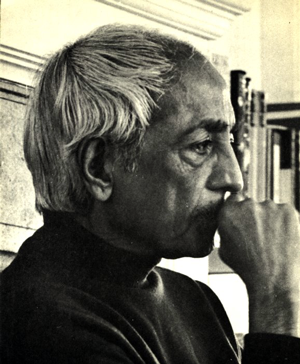QUESTION: In your talks you speak of death as total annihilation; also you have said that after death there is immortality, a state of timeless existence. Can one live in that state?
 JIDDU KRISHNAMURTI : I did not use the word annihilation; I have said that death is an ending – like ending attachment. When something ends, like attachment, something totally new begins. When one has been accustomed to anger all one’s life, or greed or aggression and one ends it, something totally new happens. One may have followed a guru, with all the gadgets he has given one; one realizes the absurdity of it, and one ends it. What happens? There is a sense of freedom from the burden which one has been uselessly carrying. Death is like ending an attachment.
JIDDU KRISHNAMURTI : I did not use the word annihilation; I have said that death is an ending – like ending attachment. When something ends, like attachment, something totally new begins. When one has been accustomed to anger all one’s life, or greed or aggression and one ends it, something totally new happens. One may have followed a guru, with all the gadgets he has given one; one realizes the absurdity of it, and one ends it. What happens? There is a sense of freedom from the burden which one has been uselessly carrying. Death is like ending an attachment.
What is it that has continued through life? One puts death in opposition to living. One says death is at the end of life; an end that may be ten or fifty years away – or the day after tomorrow. One hopes it will be ten years or more, but this is one’s illusion, one’s desire, a kind of momentum. One cannot understand how to face death without understanding or facing living, for death is not the opposite of living.
Much more important than asking the question: how to face death or, what is immortality or, whether that immortality is a state in which one can live, is the question of how to face life, how to understand this terrible thing called living? Because living as one does, is meaningless. One may try to give meaning to life, as most people do, saying life is this, or life must be that, but putting aside all these romantic, illusory, idealistic nonsenses, life is one’s daily sorrow, its competition, despair, depression, agony – with the occasional flash of beauty and love.
That is one’s life; can one face it and understand it so completely that one is left with no conflict in life? To do that is to die to everything that thought has built up. Thought has built one’s vanity, thought has said, “I must achieve, become somebody, struggle, compete”. That is what thought has put together, which is one’s existence. One’s gods, churches, gurus, rituals, all that is the activity of thought, a movement of memory, experience, knowledge stored up in the brain, a material process. And when thought dominates one’s life, as it does, then thought denies love. Love is not a remembrance. Love is not an experience. Love is not desire or pleasure.
Living that way, dominated by thought, one has separated from life that thing called death, which is an ending, and one is frightened of it. If one denies everything in oneself which thought has created – and this requires tremendous grit – what has one? One is with death; living is dying and so renewal.
One is trained to be an individual – me as opposed to you, my ego against your ego. But the fact is that one is the entire humanity. One goes through what every other human being goes through, all one’s sexual appetites, indulgences, sorrow, great hope, fear, anxiety, the immense sense of loneliness – that is what every human being has, that is one’s life. One is the entire humanity, one is not individual. One likes to think one is, but one is not.
There is a life in which there is no centre as ‘me’, a life, therefore, walking hand in hand with death; and out of that sense of ending totally, time has come to an end. Time is movement, movement is thought, thought is time. When one asks: “Can one live in that eternity?” – one cannot understand. See what one has done. “I want to live in eternity, to understand immortality” – which means the `I’ must be part of that. But what is the ‘I’? A name, a form, and all the things that thought has put together; that is what the ‘I’ actually is, to which one clings. And when death comes through disease , accident, old age, how scared one is.
